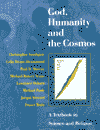The Weak Anthropic PrincipleThe approach which does the least violence to conventional modes of scientific thought is to invoke a Weak Anthropic Principle (WAP). Barrow and Tipler describe it thus:
In other words, our existence as observers functions as a cosmological selection effect. There can be no observations without observers. Our observations must satisfy the conditions necessary for our existence. However, the WAP does not take us very far towards an explanation of the observed coincidences. In conjunction with a conventional Big Bang cosmology, it still gives the impression that our existence is an accident of vanishingly small probability. Thus, in practice, it usually appears in conjunction with a cosmological model which suggests that there is a sense in which all possible universes actually exist. See Many-Universes Models and Analysing the Anthropic Arguments.
Email
link | Feedback |
Contributed by: Dr. Christopher Southgate |




